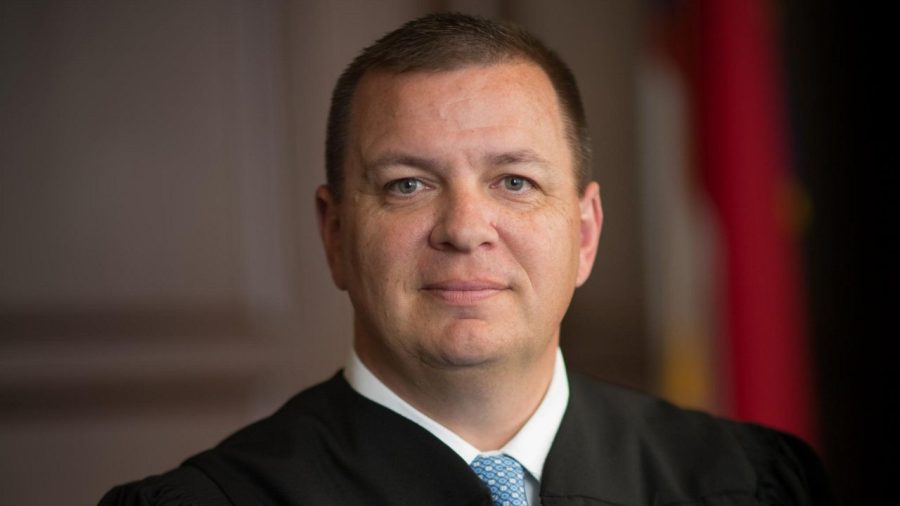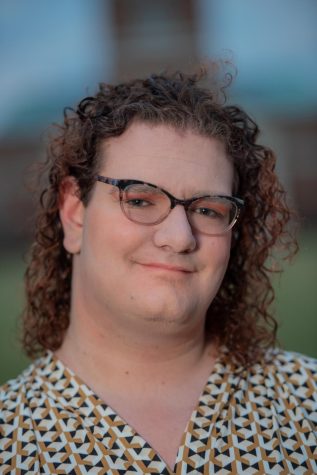WFU Law graduates on the NC Supreme Court: Phil Berger, Jr.
Berger shares his experiences as a ‘Wake Forest lawyer’
Phil Berger Jr. has been a justice of the N.C. Supreme Court since 2020.
March 15, 2023
Long before Phil Berger, Jr. (R) was an associate justice of the North Carolina Supreme Court, he was a third grader roaming the Reynolda campus. His father, who later went on to be President Pro Tempore of the N.C. Senate, was attending law school at Wake Forest, and his mother had a job in the admissions office.
“After school every day, I was on campus,” Berger remembered, smiling. “And I was running around Carswell Hall, which used to be the law school, and running around the quad. So that was my first exposure to Wake Forest — it was a place where Mom and Dad spent a lot of time, and I got to go shoot basketballs in the old Reynolds Gym.”
Eventually, Berger would also attend Wake Forest law school after studying history at UNC Wilmington.
“It was really a dream come true to be able to return to Winston-Salem and Wake Forest and be able to follow in my dad’s footsteps a little bit,” Berger said.
Berger often referred to the concept of a “Wake Forest lawyer,” or a lawyer who serves smaller, more rural and often underrepresented communities.
“There was a time in the school’s history where most of the lawyers in North Carolina, and particularly the rural areas, were graduates of law school at Wake Forest,” Berger said. “And there was a standard that they had set with their professional standards, competency standards and leadership in the community.”
Berger said later: “It’s a standard I hope they (the law school faculty) are attempting to instill today…The idea that you can go into certain communities and be a real messenger of Pro Humanitate is, I think, very important.”
It appears as though Wake Forest lawyers are still in abundance. In a graduate employment survey, about 20% of Wake Forest law school’s Class of 2021 (the latest class for which data exist) reported working in public interest or government.
Shortly after graduating from law school, Berger joined his family’s firm. Berger said that as a private attorney, he worked on cases in many different areas of the law.
“[In a] small town, you do just about anything that walks into the door because that’s just the nature of business there,” Berger said.
Then, in 2006, Rockingham County voters elected him district attorney, a position he served in for eight years. Then, after losing a bid for Congress in 2014, he became an administrative law judge. Berger said he never really considered going further than that, but in late 2015, the phones began to ring.
“I started getting phone calls saying, ‘Hey, you, you really should look at running for the Court of Appeals,’” Berger said. “And I told everyone who called, ‘No, I’m not interested.’ And phone calls continued to come in… it really was like this, ‘We don’t have anybody else to do this. We need you to do this.’”
Berger eventually decided to run and filed just before his family left for a winter vacation to Disney World in Florida. Berger won, defeating incumbent Democratic Judge Linda Stephens. Then, in 2020, phones began to ring again, this time about the N.C. Supreme Court. This time, though, Berger chose to run at first opportunity. He defeated Democrat Lucy Inman in 2020 to become a justice. Berger said that throughout this, he never lost sight of his desire to be in public service.
“My service in the public sector came out of a desire … to do things or to try to do things better [in Rockingham County],” Berger said. “And again, I think that fits into this notion of a Wake Forest lawyer — that you want to serve the community and do it in a way that you improve and follow through with what you say you’re going to do.”
Berger’s life in the public sector has come under fire, however. In 2013, it came out that a live feed of all courtrooms in the Rockingham County Courthouse were broadcast to Berger’s office. More recently, Berger has come under fire for participating in a case about voter identification laws because his father, Phil Berger, Sr., is president of the North Carolina Senate. Berger Jr. who said he received death threats at times, detailed his views on criticism in general — it is N.C. Supreme Court policy that justices cannot speak to media about individual cases.
“It’s something you have to experience and go through [to prepare for] ,and the more those sorts of issues present themselves, the easier it is to absorb constructive criticism and ignore the noise,” Berger Jr. said. “And one of the benefits of having people like Justice [and fellow Wake Forest graduate Richard] Dietz, and others in your close circle i if there is criticism that comes from individuals that I have a great deal of respect for, then that criticism or direction tends to mean a great deal more than somebody on their keyboard sending messages through Twitter.”
Berger Jr. continued: “[Tweets] are easy to ignore, but [if it’s] somebody you know and respect, if they give you some pointers, you tend to take those to heart a little more.”
Berger Jr. also spoke to the experience of having another Wake Forest lawyer on the court with him.
“It’s just a real pleasure to have not only somebody from Wake Forest with that experience, but somebody who, who enjoys many of the same things, to work with and bounce ideas off,” Berger Jr. said of Dietz. “And then the other thing with Wake, as I mentioned previously, it’s just the ability to give back to the community, and Justice Dietz shares that philosophy. That part of our responsibility now, being judges on the Court of Appeals or justices on the Supreme Court.”















